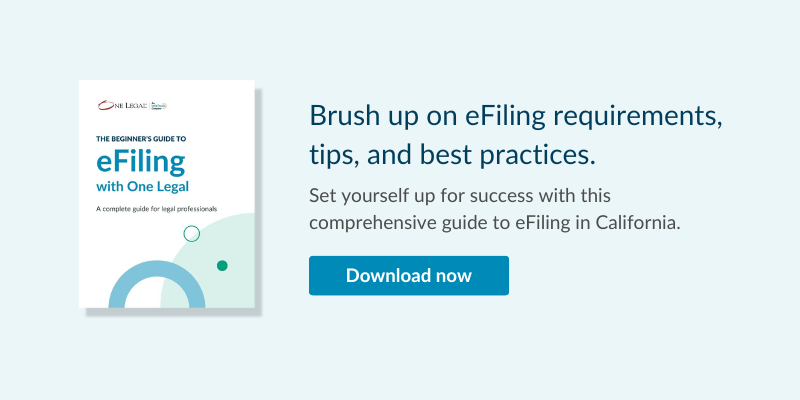Santa Clara County will soon begin requiring electronic filing. What do you need to know to be prepared?
Court officials have recently announced that, beginning June 2016, Santa Clara County Superior Court will start to implement electronic court filing for civil cases.
The county, which includes Palo Alto (Apple), Mountain View (Google), and Sunnyvale (Yahoo!), as well as the city of San Jose, is home to many of the country’s most advanced tech companies. The local superior court’s decision means that Silicon Valley’s courts are now embracing the latest in court technology.
Santa Clara becomes the 12th superior court in California to implement electronic court filing, with many more making the change between now and the end of 2017. Whereas many courts have rolled-out eFiling somewhat gradually, Santa Clara is making swift moves to eFiling, meaning it will pay to be on top of the changes and working with a reliable eFiling Service Provider (EFSP).
A phased implementation
On May 26, 2016, the court published a resolution and order giving the jurisdiction the necessary powers to make eFiling mandatory during 2016.
Initially, electronic filing will be introduced for family and probate cases. Attorney-represented parties (self-represented litigants will still be permitted to file physically) will be allowed to eFile from June 20, 2016, and, assuming all goes smoothly for the court during the permissive period, required to eFile from August 1, 2016.
There’ll also be a change concerning complex cases currently eFiled via the court’s GloTrans vendor. From June 20, 2016, you’ll be able to use one of the court’s approved eFiling Service Providers (such as One Legal). The GloTrans system will be likely be discontinued from July 1, 2016 and you’ll be required to use another EFSP.
As of June 21, 2016, the court’s proposed timetable is as follows:
- June 20, 2016 — Optional eFiling for family and probate cases begins.
- July 1, 2016 — The court’s GloTrans portal shuts down. Complex cases must be filed using another certified EFSP, such as One Legal.
- August 1, 2016 — Mandatory eFiling for family and probate cases begins.
- September 1, 2016 — Mandatory eFiling for small claims, unlawful detainer, and civil harassment cases will begin.
- Late fall 2016 — Mandatory eFiling for all other civil case types, including limited and unlimited, will likely begin.
- November 2016 — Juvenile dependency e-filing will likely become mandatory.
- February 2017 — For juvenile justice, e-filing will likely become mandatory.
During this complicated transition, you can rely on One Legal to get your documents where they need to go, no matter how they need to go. We will automatically eFile or physically file documents according to the court’s local rules, ensuring that you’re able to successfully file when you need to in Santa Clara.
Simplify your legal support: choose a comprehensive service
During this transitionary period, you’ll likely have to eFile some cases, while continuing to file others physically. Add to this the fact that some judges will require paper courtesy copies of eFilings to be delivered in some cases, and it’s clear that an electronic-only provider wouldn’t provide all the services you need for just one case.
One Legal is the answer.
With a One Legal account, you can use the same clear and easy-to-use workflow to upload documents regardless of how they need to be filed. If they can be filed electronically, they’ll be passed securely to the court’s system; if they need to be physically filed, our team of document specialists will print, bind, and deliver your filing for you. Either way, you’ll get updates via email and 24/7 access to status information online.
Better still — unlike all of the basic online eFiling services — with One Legal, you can seamlessly add on crucial physical services like courtesy copy delivery and process serving at the click of a button as you file.
We know your documents are important, which is why we give them the care and attention they require. It’s why we’ve been voted California’s best court filing service and its best process server by readers of “The Recorder” every year since 2013.
Learn local rules and requirements
While using a platform like One Legal makes filing simple, it’s important to understand the court’s preferred style and formatting requirements. The rules relating to eFiled documents differ a little from those concerning physically filed documents.
This means that, depending on the size and complexity of your filing, you may need to apply some formatting changes, such as adding in exhibit title pages or applying optical character recognition (to make scans text-searchable) using a PDF editor such as Adobe Acrobat.
If you’re looking for immediate support, we’ve also got a team of California-based support staff available via phone or email throughout the day.






